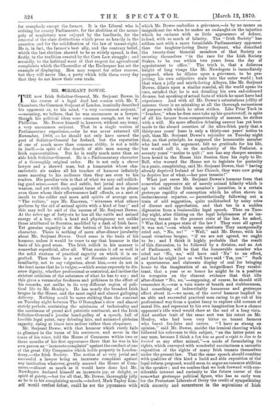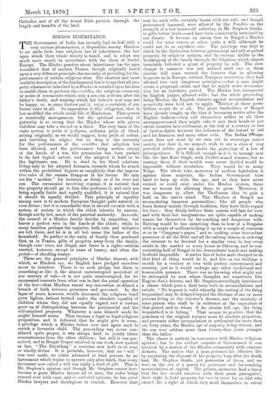MR. SERJEANT DOWSE.
THE new Irish Solicitor-General, Mr. Serjeant Dowse, in the course of a legal duel last session with Mr. T. Chambers, the Comthon Serjeant of London, ironically described
his opponent as, to his mind, "a very uncommon serjeant," —meaning, we believe, that he was uncommon as a lawyer, thou1gh his political ideas were common enough, not to say Philistine. Mr. Dowse himself is, however, without any irony, a very uncommon serjeant. That in a single session of Parliamentary experience,—for he was never returned till November, 1868, — he should not only have earned the post of Solicitor-General for Ireland, but the reputation of one of much more than common ability, is not a trifle in itself,—in spite of the dearth of able men among the Irish representatives. But he is really much more than an able Irish Solicitor-General. He is a Parliamentary character of a thoroughly original order. He is not only a clever lawyer and a shrewd man, but a humourist whose cha- racteristic air makes all his touches of humour infinitely more amusing to his audience than they are even to his readers. His peculiar vein is that of what we may call rollick- ing good sense,—not fine and subtle, but jovial and almost wanton, and yet with such quaint turns of mood as to please even those whom their effervescence half offends, as a sort of insult to the colder and more arid spirits of average men. " The recluse," says Mr. Emerson, " witnesses what others perform by the aid of animal spirits with a kind of fear ;" and this may well be said of the success of Mr. Serjeant Dowse. At the sober age of forty-six he has all the rattle and animal energy of a boy, with a head and physiognomy not unlike those attributed to Socrates, modified by a dash of Irish farce. Yet genuine sagacity is at the bottom of his whole air and character. There is nothing of mere after-dinner jocularity about Mr. Serjeant Dowse. Good sense is the basis of his humour, unless it would be truer to say that humour is the basis of his good sense. The Irish rollick in his manner is somewhat superficial, after all. What carries it off so well is the solid stratum of practical sagacity on which it is en- grafted. Then there is a sort of Socratic ostentation of familiarity, not to say vulgarism, about him,—we do not in the least mean that he is vulgar,—which seems expressly to dis- avow dignity, whether professional or oratorical, and invites the strictest criticism of the substance of what he has to say ; and this gives a vernacular freshness and pithiness to the effect of his remarks, not unlike in its very different region of poli- tical life to Mr. Henley's. He has nearly the broadest Irish brogue in the House, and the most rapid and almost galloping delivery. Nothing could be more striking than the contrast on Tuesday night between The O'Donoghue's slow and almost stately periods, containing the minimum of technicality and the maximum of proud and patriotic sentiment, and the Irish Solicitor-General's jocular hand-gallop of a speech, full of forcible legal point, racy debating hits, and animated plebeian sagacity, rising at times into ardour rather than eloquence.
Mr. Serjeant Dowse, with that humour which rarely fails to glimmer in the turns of his sentences, and never in the tones of his voice, told the House of Commons within two or three months of his first appearance there that he was in his own person an " incarnate complaint" against the conduct of one of the great City Companies which holds property in London- derry,—the Irish Society. The notion of so very jovial and successful a lawyer being an incarnate complaint against any institution whatever, greatly amused the House of Com- mons,—almost as much as it would have done had Mr. Newdegate declared himself an incarnate joy, or delight, or spirit of gaiety,—but for all that, Mr. Dowse, thoroughly jolly as he is in his complaining moods,—indeed, Mark Tapley him- aelf would confess defeat, could he see the joyousness with
which Mr. Dowse embodies a grievance,—is by no means an insignificant foe when he makes an onslaught on the injustice which he endures with so little appearance of dolour, indeed, with so much of hilarity. The "Irish Society" has seldom met with a more formidable Parliamentary opponent than the laughter-loving Derry Serjeant, who described the twenty-four biennial members of that Society as entering themselves "in the race for the Irish Society Stakes, to be run within two years from the day of appointment to office." The truth is, that a dolorous knight of long visage like Mr. Newdegate is immediately supposed, when he dilates upon a grievance, to be pro- jecting his own subjective state into the outer world ; but that when a jolly and mirth-loving Allegro, like Mr. Serjeant Dowse, dilates upon a similar scandal, all the world opens its ears, satisfied that he is not detailing his own sad-coloured dreams, but speaking of actual facts of which he must have had experience. And with all Mr. Dowse's ostentatious jollity of manner, there is no mistaking at all the thorough earnestness of purpose with which he often strikes. Like Friar Tuck in "Ivanhoe," when he does once take up his quarterstaff, in spite of all his former boon-companionship of manner, he strikes with a will. No more effective debating answer has yet been made to the absurd assertion of '.he ultra-Irish party that a thirty-one years' lease is only a thirty-one years' notice to quit, than Mr. Serjeant Dowse's rejoinder on Tuesday night that, on that principle, he supposed the honourable member who had used the argument, felt no gratitude for his life, but would call it, on the authority of the Psalmist, a seventy years' "notice to quit ;" nor has any sharper sarcasm been heard in the House this Session than his reply to Dr. Ball, who warned the House not to legislate for posterity in a panic, complaining, said Mr. Serjeant Dowse, that " having already deprived Ireland of her Church, they were now going to deprive her of what, —her poor tenants !"
What just saves Mr. Serjeant Dowse's humour from that somewhat oppressive air of merely animal hilarity which is apt to attend the Irish member's jocosities, is a certain grotesque rapidity of conception which he often shows in instantaneous repartee, — parenthetically following out a train of odd suggestion, quite undisturbed by noisy cries of dissent and approbation, and that too in a sudden digression from a businesslike legal speech. Thus on Tues- day night, after dilating on the legal helplessness of an im- proving tenant in the present state of the law, he asked, " Was that a proper state of the law ? They were all agreed it was not,"—on which some obstinate Tory unexpectedly cried out, "No, no! " " Well," said Mr. Dowse, with his usual vivacious brogue, "if we are not agreed, we ought to be ; and I think it highly probable that the result of this discussion, to be followed by a division, and an Act of Parliament, will be that the honourable member who cried out 'No, no,' will have said 'No' to no effect, and that he might just as well have said Yes, yes.' " Such a spontaneous and elaborate display of zeal for bringing home to the imagination of an insignificant Tory recalci- trant, that a year or so hence he might be in a position to recognize on the clearest evidence that that idle after-dinner "No, no,"—supposing, of course, he should still remember it,—was a vain waste of breath and stubbornness, had something of indescribably humorous and grotesqne effect about it, —we mean, of the moral humour implied in an able and successful practical man caring to go out of his professional way from a quaint fancy to explore odd corners of moral life, and represent to his own imagination how a chance opponent's idle word would show at the end of a long vista.
And another trait of the same sort was his retort on Mr.
Henley, who had been very bitter on tenant farmers who burnt fox-lairs and covers. " I have as strong an opinion," said Mr. Dowse, amidst the ironical cheering which followed his reference to this subject, "on the latter point as any man, because I think a fox has as good a right to live to be hunted as any other animal,"—a mode of formulating its rights, which conveyed with wonderful succinctness a sarcastic exposition of the rights of many Irish tenants themselves under the present law. That the same speech should combine with qualities of this kind a lucid and able exposition of the legal reform proposed, would seem to argue no common abilities in the speaker ; and we confess that we look forward with con- siderable interest and curiosity to the future career of the somewhat grotesque political figure, who has so early won
for the Protestant Liberals of Derry the credit of sympathizing with sincerity and earnestness in the aspirations of Irish
Catholics and of all the truest Irish patriots through the length and breadth of the land.



































 Previous page
Previous page